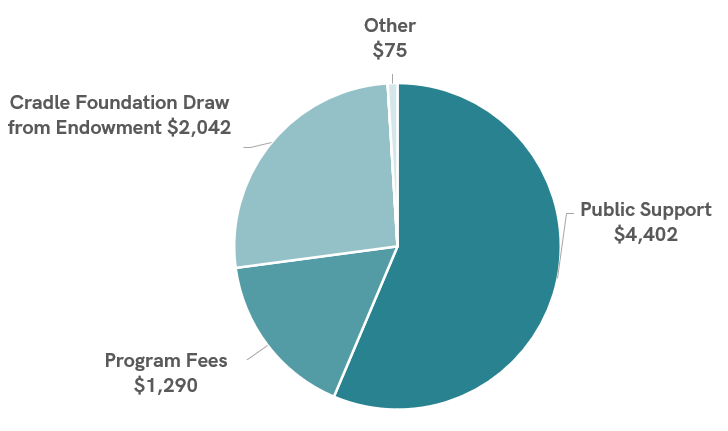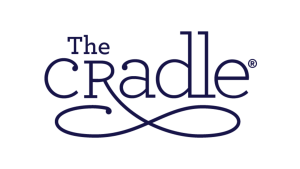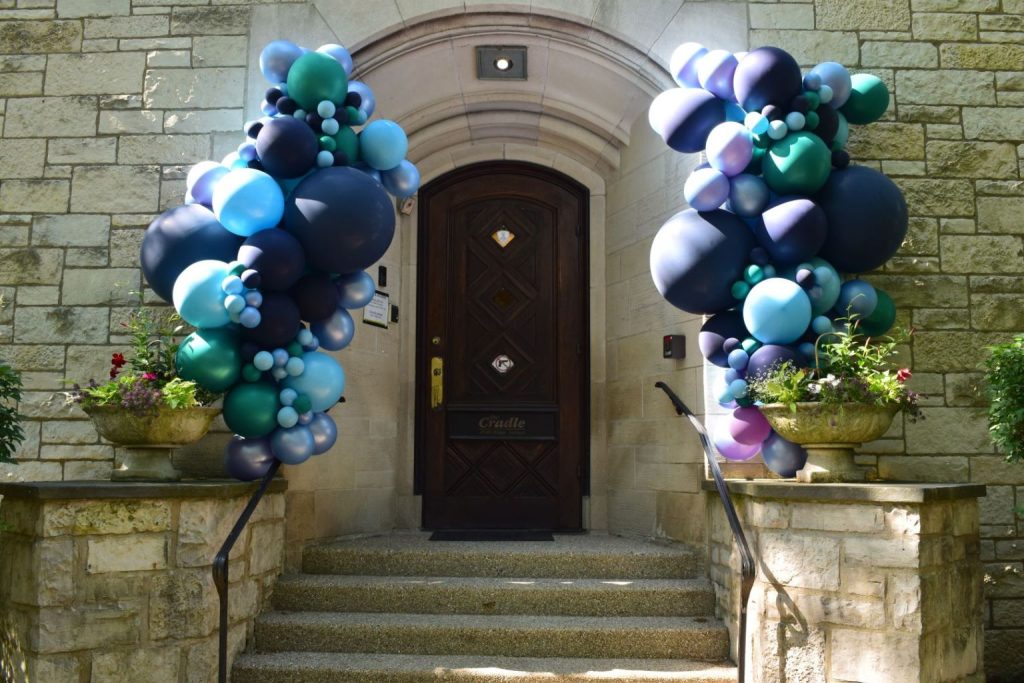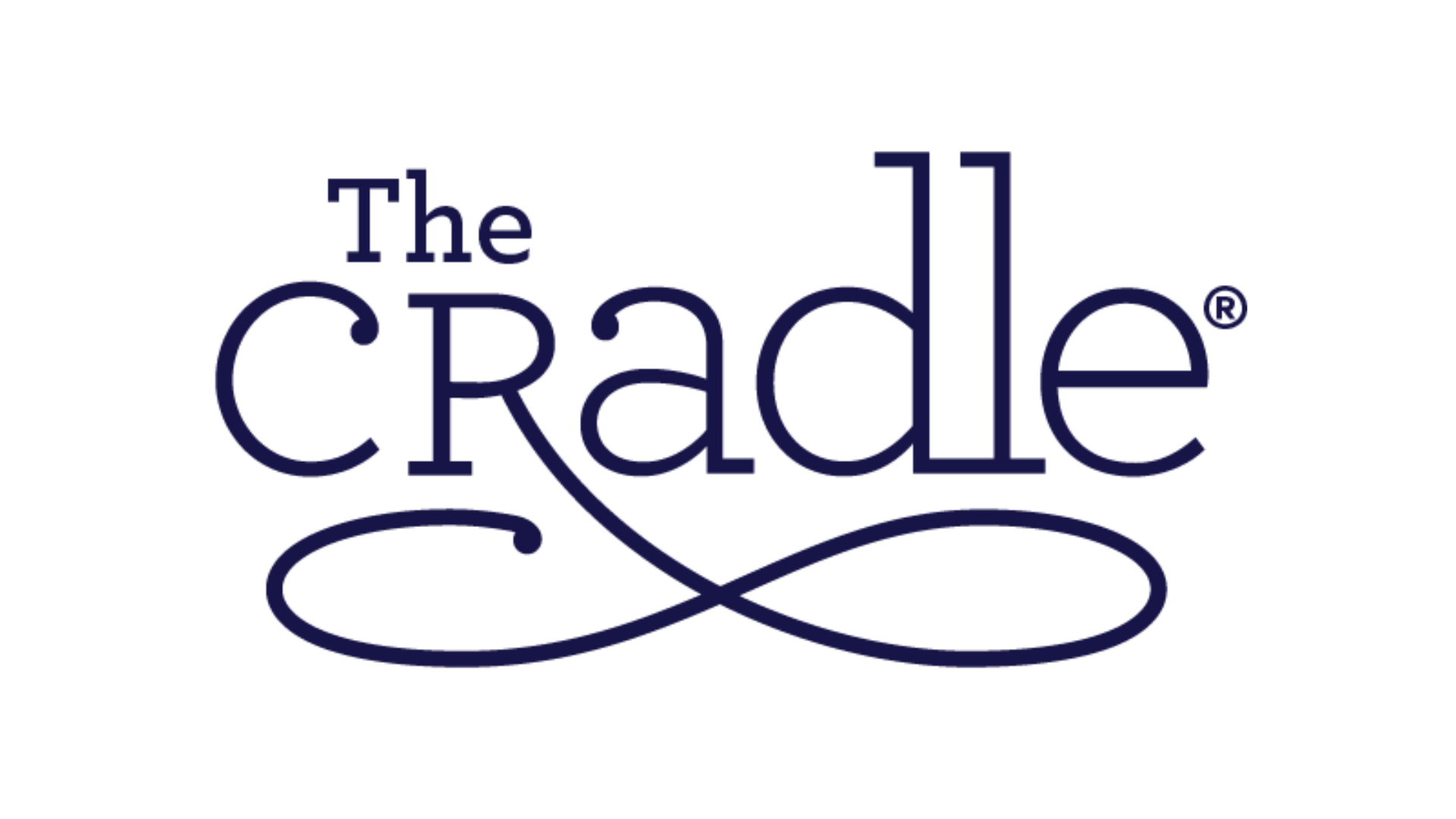Living Into Our Lifelong Commitment
The Cradle 2023 Annual Report
Explore the 2023 Annual Report
Walking Alongside You
The Cradle walks with those navigating how to best support themselves, their children and their families.
Building Families
Building families through adoption can be beautiful, complex and hard. Adoption is not a moment; it is lifelong.
Supporting Lifelong Journeys
The Cradle is here to serve anyone touched by adoption — whether through The Cradle or not.
Cradle Centennial
2023 was a milestone year, with The Cradle celebrating 100 years of building families through adoption.
Community Support
Our dedicated community of supporters demonstrated remarkable generosity throughout our Centennial year.
Financial Information
Amidst this pivotal moment in our history, we strategically invested in expanding services to the community.
A Letter from Our CEO
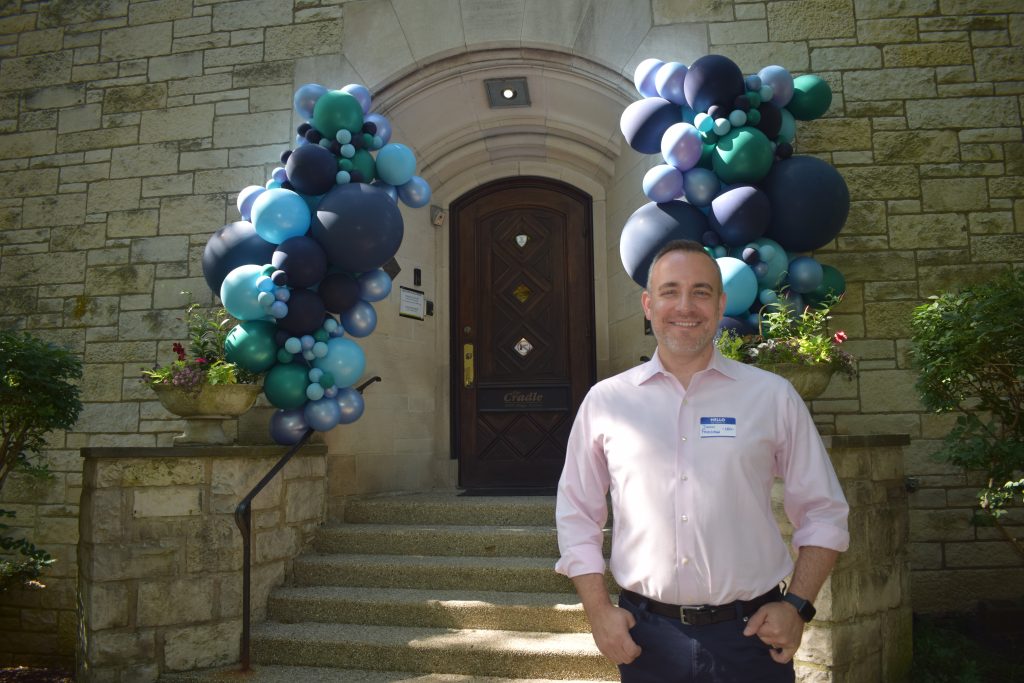 This annual report arrives at a unique time. 2024 is a true turning point for The Cradle. We are building a bright path forward: addressing how the evolving landscape of adoption, the dynamic needs of our families, and the opportunity to channel our strengths to better serve the broader community will be reflected in our second century of service.
This annual report arrives at a unique time. 2024 is a true turning point for The Cradle. We are building a bright path forward: addressing how the evolving landscape of adoption, the dynamic needs of our families, and the opportunity to channel our strengths to better serve the broader community will be reflected in our second century of service.
As The Cradle prepares for the next 100 years, the day-to-day work of our dedicated team of professionals never stops. The education, care, and counseling we provide are propelled by The Cradle’s vision: a world where every child thrives in a safe and loving family.
This vital work is anchored by a lifelong commitment. We know that adoption is complex and so much more than a moment in time. We recognize that people whose lives are shaped by adoption may have different feelings and needs at different times in their lives. Whenever you need us, The Cradle is here to walk alongside you and support you on your adoption journey.
The profiles in these pages provide brief glimpses into David’s, Anna’s and Abby and Layla’s adoption journeys. The families themselves are the main characters in their stories, of course, with The Cradle playing an important but supporting role. We celebrate these families and the thousands of others we have had the privilege to serve. We thank our generous community of supporters for making our work possible and for helping to fuel our ambitions for the future.
With gratitude,

Jason Friedman
President & CEO
Walking Alongside
Life is not a straight line. Decision-making around parenting and adoption is complex and filled with emotion. The Cradle is here to walk with those trying to decide what’s best for themselves and their child, and with anyone in the adoption circle navigating life post adoption.
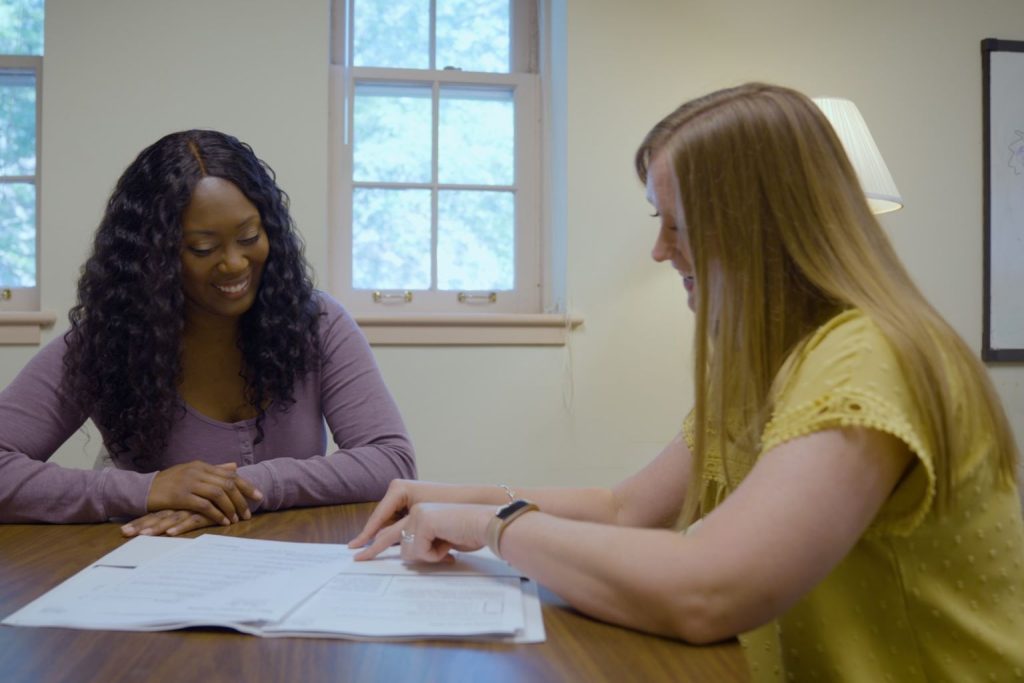
Expectant parents supported through a time of crisis by The Cradle Helpline
Clients who received options counseling to help them explore parenting or adoption
From public support to cover counseling and other services for expectant parents
Admissions to The Cradle Nursery
Days babies spent on average in the Nursery
Faces of The Cradle
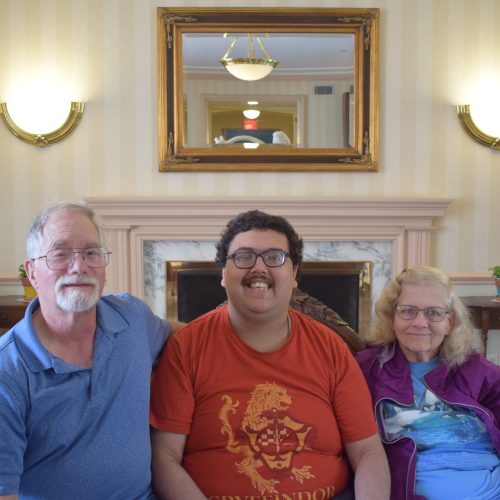
David’s Story: Lifelong Support
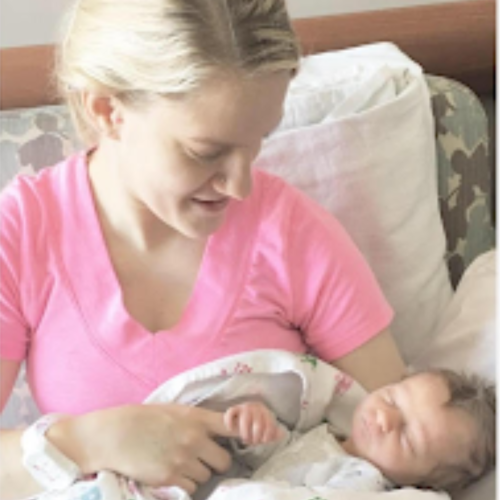
Anie’s Story: A Birth Mother’s Open Adoption
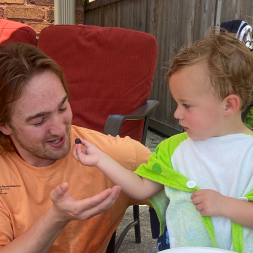
Tyler’s Story: Birth Parents Find Joy Through Open Adoption

David’s Story: Lifelong Support
Rae Ellen and Matthew adopted their son, David, in the summer of 1992. They returned to visit The Cradle the day before David’s 32nd birthday to see where it all began and to share their family story.
David’s birth mother made an adoption plan and then decided she wanted to parent him. A few months later, she changed her mind again.
“Our paperwork came in while she had him home. She brought him back because she was nervous about taking care of him,” Rae Ellen said. “She liked what she read in our packet, so she picked us.”
David was born with a rare birth defect called agenesis of the corpus callosum (ACC). Rae Ellen and Matthew were aware of this at the time of adoption.
“There’s not a lot of information about ACC,” Rae Ellen said. “And when talking to the doctors, they said physically he seems to be doing okay. It took him a little longer with some things, but he learned to talk at around four and a half. Two, I think, before he started walking. He rolled on the floor to get to where he wanted to go.”
Rae Ellen and Matthew had only completed the home study process a month or two before getting the call about David. “I was surprised because they told us it could take a while,” Rae Ellen said.
“Terrified,” Matthew added.
“It was just meant to be,” Rae Ellen said.
Rae Ellen and Matthew were open to any level of openness that David’s birth mother was comfortable with. “The only things she had asked for were pictures and letters,” Rae Ellen said. Over the years, they sent updates to The Cradle to share with her. She was aware these letters and photos were waiting for her, but they did not have contact until much later in David’s life.
However, the birth mother stayed in regular contact with The Cradle’s post-adoption counselors for years. They provided support and talked her through thoughts and feelings about her adoption plan. And when she was ready to meet David and his family, Nina Friedman, Director of Post-Adoption Support, arranged the visit.
This took the family by surprise. David was 25 years old. When asked how he felt before the visit, David said, “Good, nervous and excited.”
They met at a public library where they talked about their lives, families and who the birth mother thought David resembled. The family spoke fondly of their visit, but unfortunately, haven’t heard from her since. This has been difficult for the whole family. “Even if we don’t hear from her, you still have two moms, right?” Rae Ellen said to David.
Rae Ellen and Matthew said they are grateful for The Cradle’s support over the years, especially in facilitating contact with David’s birth mother. “It’s a very good place. They set up the meeting. I wouldn’t have been able to do that,” Rae Ellen said. “I kept in touch through the years and, and [Cradle counselors] would call every so often to check in. I don’t think you find that at all agencies.”
Today, David lives in a group home, goes to work and sees his parents often. “He’s always been a people person,” Rae Ellen said. The highlight of his return to The Cradle was visiting the Nursery — the place where his journey began 32 years before.
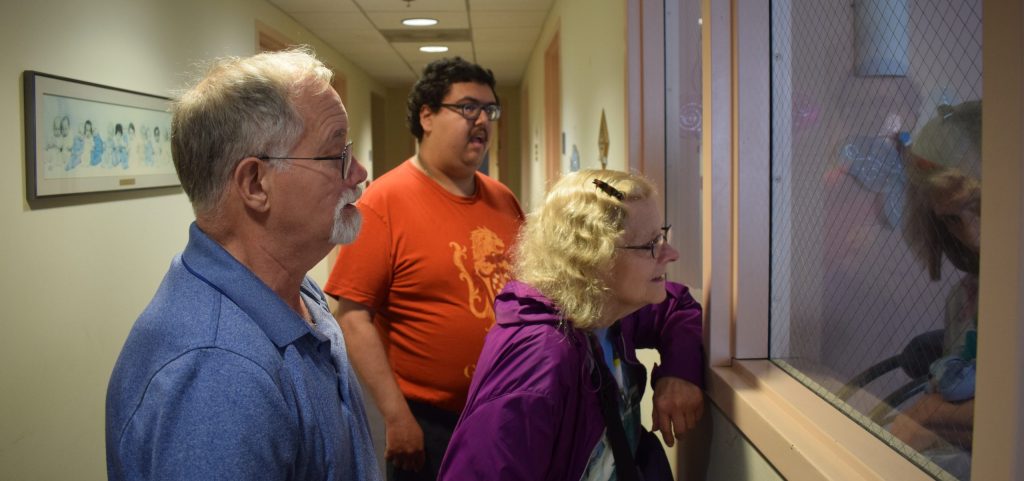

Anie’s Story: A Birth Mother’s Open Adoption
Anie was five months along when she found out she was pregnant. At the time, she was already caring for her father and grandmother, who had both fallen sick. “It was a scary moment,” Anie recalls, then just 22 years old. “I felt I wasn’t in the right place to parent.”
Anie herself was adopted as a baby. Born in Poland, her adoption was closed, meaning she never knew her birth parents. When she received her Polish birth certificate as a senior in high school, it was the first time she ever saw her mom’s name.
“I didn’t want to put my child through a closed adoption like mine. But other than that, I had no idea where to start,” she says. She began researching agencies, eventually selecting The Cradle because of our open adoption program.
Anie’s counselor provided the resources and expert support she needed, and soon, it was time to pick the adoptive parents. She chose a couple, Melissa and Mike. On top of sharing her enthusiasm for open adoption, they were also dog lovers and avid zoo-goers, just like Anie.
Seven eventful years later, Anie couldn’t be happier with her choice. She sees Melissa, Mike and (not so) little Leo several times a year. “From our first meeting until now, it’s been nothing but amazing,” she says. “They’re my second family.”
Since placement, Anie got married (with her second family in attendance) and is now parenting two younger sons, Odin and Henry, who Leo calls his “tummy brothers.” The bond between the two families has been a constant source of love and comfort, not least for Anie.
“Because I watched Leo grow up and saw how great he was doing, I didn’t feel bad when I decided to parent Odin. It was still scary, but having Mike and Melissa gave me confidence. They helped me realize I really could be a good parent.”

Tyler’s Story: Birth Parents Find Joy Through Open Adoption
After agreeing they weren’t emotionally ready to care for a child, birth parents Tyler and Madison decided adoption was the right choice for their son Myles. Through The Cradle, they were able to complete an open adoption with an adoptive family. Tyler and Madison now visit Myles several times a year and cherish the strong bond they have with him and his adoptive parents. Watch their story.
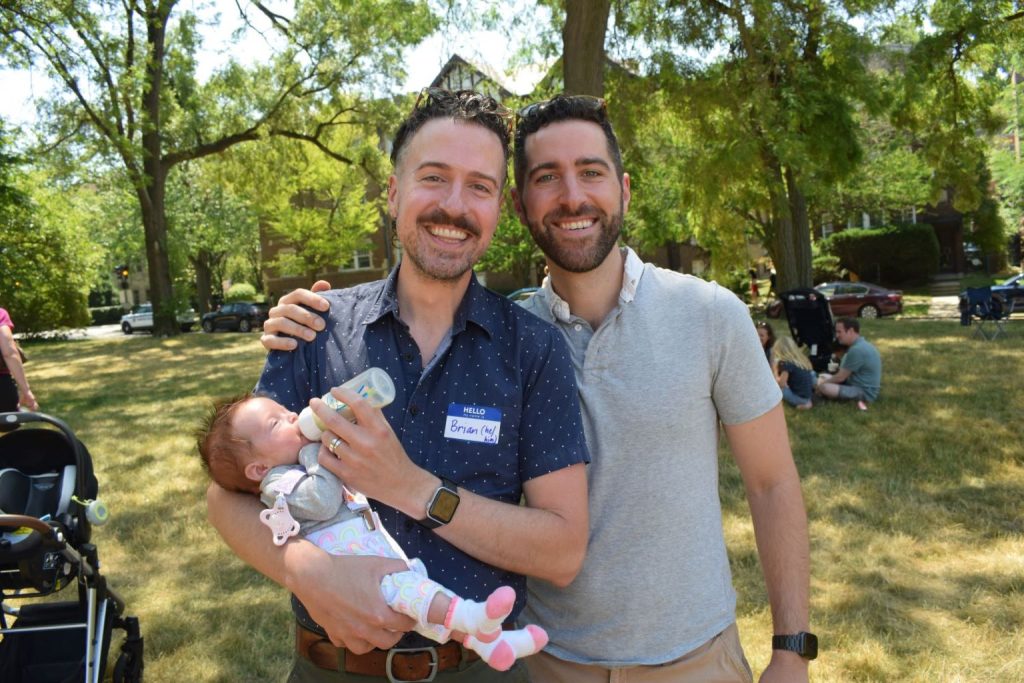
Building Families
Building families through adoption can be beautiful, complex and hard. Adoption is not a moment. It is lifelong, shaping everyone touched by it. The Cradle is committed to all of our families throughout this lifelong journey.
Families began their adoption journeys at an information session
Black or multi-racial children placed with Black or multi-racial adoptive families
Placements with LGBTQ+-identifying families in The Cradle domestic program
Cradle domestic placements
Agency-assisted placements
Intercountry placements
Faces of The Cradle
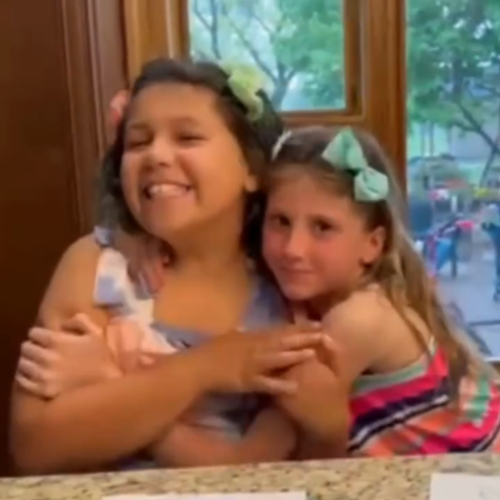
Abby and Layla’s Story: Best Friends Since the Cradle Nursery
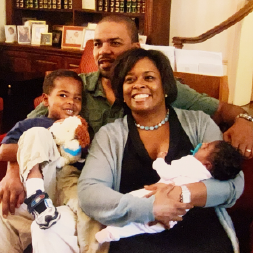
The Youngs’ Story: Finding Hope After Tragedy
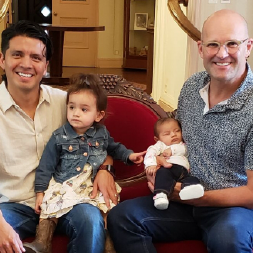
Yoni and Lee’s Story: Meant to Be
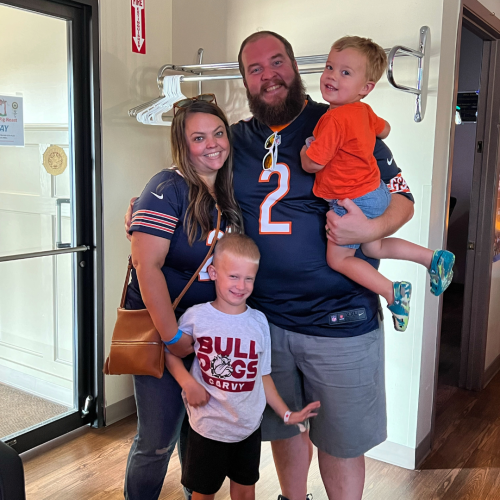
The Oskielunas’ Open Adoption Story

Abby and Layla’s Story: Best Friends Since the Cradle Nursery
Abby and Layla are best friends who first met when they were babies in The Cradle Nursery together. Nine years later, they still refer to each other as “Roomies,” a testament to their enduring bond. They shared the story of their special friendship with The Cradle.
While the Roomies have known each other since birth, their parents also met in a unique way. “We were both running late for court,” said Abby’s mom, Jennifer.
“That’s our life. That’s why we’re friends,” added Layla’s mom, Jaime. While in court to finalize their adoptions, they struck up a conversation and found a surprising number of similarities. Not only had they both adopted daughters from The Cradle, they also lived in neighboring towns and even shared an adoption counselor. “It just clicked,” Jaime said.
These families have both found that their adoption stories have made inroads to connect with others. “The more people you tell that you were adopted, the more people you find that were adopted,” said Jaime. “You find more connections.” Layla said adoption is her “superpower.”
“It’s okay to tell people that are trustworthy that you’re adopted,” said Abby. “Be proud of it.”
The Roomies joked that they were holding hands through their cribs in The Cradle Nursery. Today, they like to hang out, swim together and “do really crazy makeup” over video calls when they can’t get together. Through their shared experience of adoption, these families have created a lasting friendship. Layla said they’ve been best friends, “for our whole lives.”
In 2023, Abby and Layla sent a video wishing The Cradle a happy 100th birthday.

The Youngs’ Story: Finding Hope After Tragedy
The Young Family wanted to give their biological son Jaxon another sibling, but a complicated medical history made them hesitant to try for another baby. After considering their options, they turned to The Cradle to help them grow their family through adoption. The Youngs feel their family is now complete, with help from The Cradle in the adoption of their daughter, Kaelyn. Watch their story:

Yoni and Lee’s Story: Meant to Be
The Parrott-Espinozas came to The Cradle to start building their family. After an emotional journey to adoption, they finally met their daughter Veron and fell in love. Then they welcomed a second daughter, Violet. The Parrott-Espinozas have built wonderful open relationships with both sets of birth parents. Watch their story.

The Oskielunas’ Open Adoption Story
Melissa and Mike Oskielunas adopted their son Leo from the Cradle in 2017. Although they were apprehensive about open adoption at first, they now have a wonderful relationship with Leo’s birth mother, Anie.
“My Husband and I got married in 2009 and immediately started trying for a family. We had multiple fertility issues throughout the years,” Melissa said. “We always thought about adoption, even prior to that.”
The Oskielunas looked into a few different agencies before ending up at The Cradle. “We really liked The Cradle because it just felt very warm, very welcoming.” Melissa said. “I think that it seems like a real commitment to lifelong support. That was really important for us on the adoptive parent side, the birth parent side and the adoptee side.”
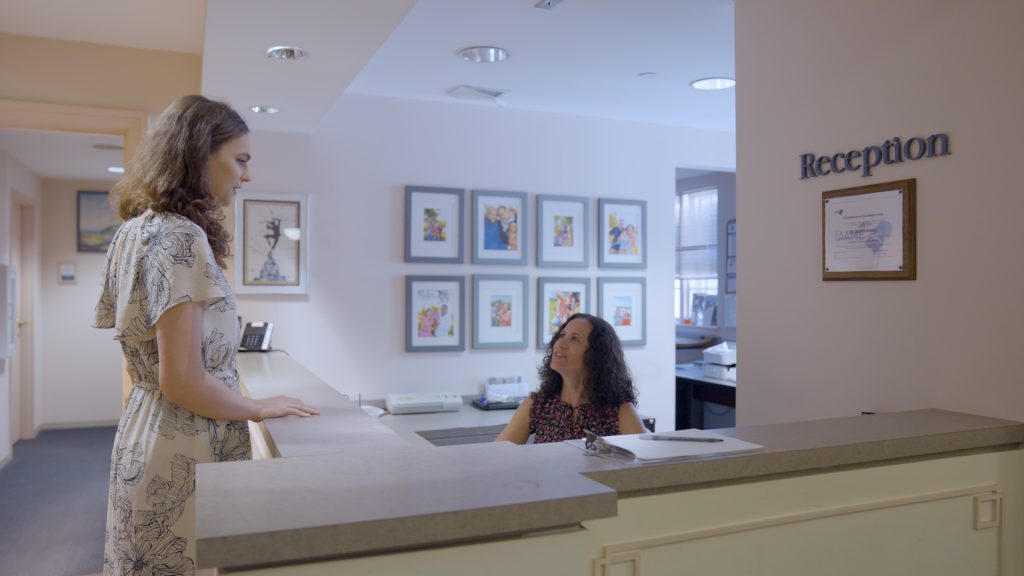
When they first began their adoption journey, Mike and Melissa were hesitant about the idea of an open adoption. “I think when we were first in the info session and going through the classes, the idea of open adoption was, frankly, scary — not knowing how we would interact with this family, not knowing what this kind of commitment would be. I think it was hard to wrap our minds around ‘Will they think that we’re not their mom and dad?’” Melissa said. “There was a lot of fear.”
But as they continued to learn more, their perspective started to evolve. “I think The Cradle did a great job of addressing those fears head on and helping us understand open adoption,” Melissa said. “And you hear a lot about closed adoption and people finding out they’re adopted later in life. We certainly didn’t want that.”
Their perspective changed even more during their match meeting with Leo’s birth mom, Anie. “I remember, before we went in, I told my husband ‘Maybe I’ll give her my e-mail address.’ And then by the end of the day, we were texting and have continued to text for almost seven years. So, our thoughts changed a lot as we got a better understanding of what it really looks like and what the benefits are to everyone involved, especially our son.”
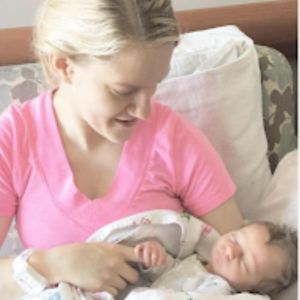
Openness has been positive for Leo
“He’s almost seven. He understands birth parents and he understands that we’re his parents. I think that’s been really beneficial to have that kind of open and honest communication with him,” Melissa explained.
Anie shared her side of their adoption story with The Cradle, too, which Mike and Melissa enjoyed reading. “I think she encompassed it so well, what our story is,” Melissa said. “She should give herself more credit. She made a really selfless, difficult choice. And I’d hate for that to be overshadowed by something that Mike and I did.”
The Oskielunas and Anie have remained close to this day. “I always knew that we would love our child. I never knew how much I would love his birth mom. She’s a huge part of our family. We went to her wedding. We have birthdays and holidays,” Melissa said. “It feels very much like any other kind of family.”
Supporting Lifelong Journeys
The Cradle is here to serve anyone touched by adoption. Our therapists offer adoption expertise and can work with all members of birth or adoptive families at any stage of life. Our dedicated post adoption department offers guidance and support to anyone touched by adoption, whether the adoption was facilitated by The Cradle or not.
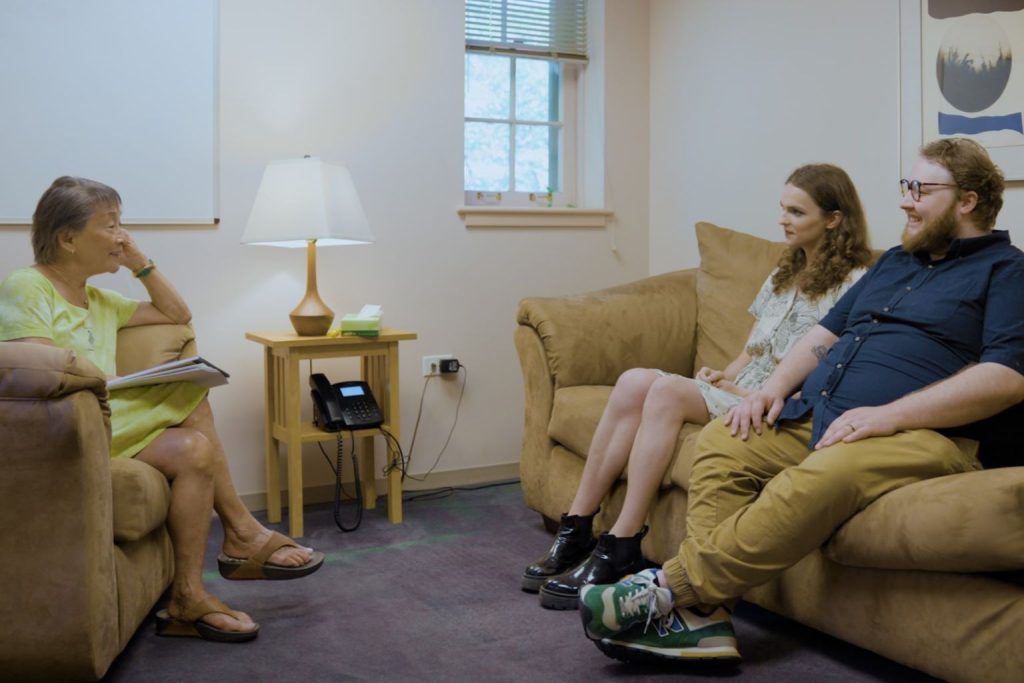
Therapy sessions
Inquiries for post-adoption services
Post-adoption services completed
New Adoption Learning Partners clients
Adoption Learning Partners webinar and course enrollments

Anna’s Story: Life-Saving Therapy
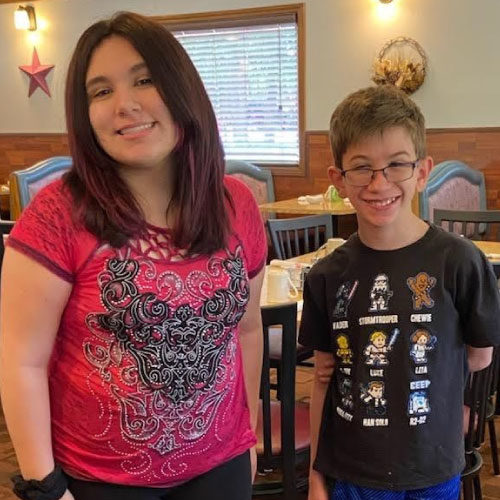
Beth and Dan’s Story: “It doesn’t end at placement”

Anna’s Story: Life-Saving Therapy
Anna was adopted at the age of one from China in the early 2000s. Like many people who were adopted, she struggled with mental health throughout her childhood and teenage years. Her mother, Abigail, was determined to find her help. She turned to The Cradle’s adoption-competent therapists — a decision that changed their lives.
Prior to finding The Cradle, Anna was taken to various kinds of doctors to seek treatment for her mental health challenges. Abigail said many of these visits were unhelpful. “None of the pediatricians, psychologists or neuropsychologists ever considered Anna’s [adoption] history in evaluating her. As a result, she was misdiagnosed for years. She had alphabet soup in her medical chart: ADHD, ODD, RAD, etc.”
Due to her misdiagnoses, Anna was heavily medicated. Abigail said the effects were often extreme. “She was medicated to the point of suicide. I was told she would likely develop serious mental illness and would spend her life in residential care.” Abigail was also told that Anna would likely never graduate from college.
Abigail began to seek a different approach in treatment for Anna and brought her to The Cradle. “Six months after starting therapy with an experienced post-adoption therapist, she was medication-free and stabilized,” Abigail said. “Her performance in school improved. She became more confident, self-accepting and started to let go of the deep shame she felt about being adopted.”
One of the most powerful moments in Anna’s therapy was a trip to The Cradle Nursery, a safe place where babies can be cared for while their parents figure out how or if they can parent their child. Anna’s counselor introduced her to a six-week-old baby, the same age she was when she was placed for adoption. “We talked about how sweet the baby was, and how there was nothing that tiny baby could have done to make his mother choose to place him for adoption. Seeing that newborn infant really helped Anna internalize that her adoption was not because she was a ‘bad baby,’” Abigail said.
This treatment not only helped Anna, but also provided support for Abigail and the rest of their family. “I think that the guidance I received in parenting was probably as important as the work The Cradle did with Anna,” Abigail said. “[The counselors] gave me tools to parent her, acknowledge her pain and advocate for her. Because of post-adoption counseling, I was able to ask for accommodations in her school that gave her the support she needed. Since then, she has become very good at advocating for herself.”
Today, Anna continues to thrive. “She is doing very well now. With the help of experienced post-adoption counselors, she has the skills to deal with many of the emotional challenges of adoption,” Abigail said. “Maybe the most important piece is that she recognizes that she was not placed for adoption because she was somehow not good enough. She is able to grieve the losses. It’s not easy, but post-adoption counseling laid a strong foundation.”
In May of 2024, Anna graduated college and her story is just beginning. “It’s hard for me to articulate how important post-adoption counseling was for our family,” Abigail said. “It pulled Anna back from the brink, saved her life and gave her tools to be a confident, capable and absolutely amazing young woman.”


Beth and Dan’s Story: “It doesn’t end at placement”
For parents Beth and Dan, The Cradle has been a central part of their adoption journey, which began more than a decade ago. When their son, James, was placed with them in 2010, they learned that his birth mother had placed other children, but none of the families had contact.
“All of us had little bits and pieces of information,” Beth says, and she began seeking out more background information with help from The Cradle as James grew more curious about from where he came. This past year, Beth and Dan were connected with two other families sharing the same birth mother so James could meet his siblings. All parents now regularly email and talk, and their growing extended family are all gathering to create new holiday traditions this year.
The spirit of open adoption – in which birth and adoptive families know who each other are or have each other’s identifying information, with or without contact – looks different in every family and evolves over time. Beth says they have been able to navigate the ups and downs of limited birth mother contact, talking about adoption at home and more with the help of the diverse cohort of parents with whom they have stayed in contact since their Cradle waiting parents group all those years ago.
“The adoption journey doesn’t end at placement,” Beth says. “It is constantly a part of who you are and who your family is. It’s never a bad thing to revisit those relationships and to have that constant connection to The Cradle as a place to go back to.”
Centennial Celebration
2023 was a milestone year, with The Cradle celebrating 100 years of building families through adoption. Since opening our doors in 1923, we have facilitated more than 16,000 domestic and international adoptions, and have been at the forefront of open adoption, African American infant adoption and placements with LGBTQ+-identifying families.
Community Support
Our dedicated community of supporters demonstrated remarkable generosity throughout our Centennial year, contributing more than $4 million to advance our programs and commemorate this significant milestone. What’s truly inspiring is that 95% of this revenue was unrestricted, offering us the flexibility to channel resources where they’re most needed and empowering us to innovate and respond swiftly to evolving challenges. With the trust of 1,481 dedicated supporters, we’ve transformed their generosity into life-altering impact. An impressive 61% of individual donations amount to $100 or less, highlighting the profound significance of each contribution.
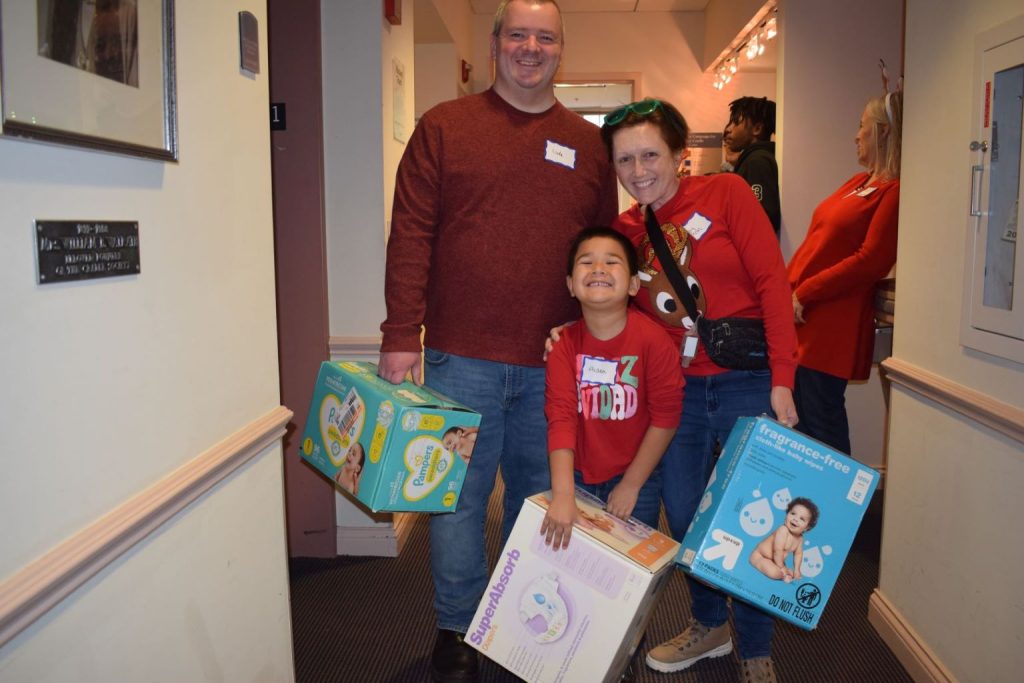
Our robust 59% donor retention rate stands as a testament to the unwavering dedication of our long-standing supporters. These contributions aren’t merely financial; they symbolize a shared commitment to change, fueling our programs, provide opportunities, and create lasting transformations in our communities. Guided by our esteemed Investment Committee, revenue derived from investments and dividends has played a pivotal role in fortifying our financial resilience.
Supporters who trusted us transform their generosity to life-altering impact
Raised for infant care, adoptive and expectant parent services, and operations
New donors who joined The Cradle community
Raised to support families during the holiday season
Of annual revenue was unrestricted, offering flexibility for wherever it’s needed most
Commemorative bricks installed to honor a loved one to date
Donor Roll
We strive to be complete and accurate in recognizing the generosity of our Cradle community. We regret any omissions or errors. Please contact our development team at cradlefoundation@cradle.org with any corrections.
Faces of The Cradle
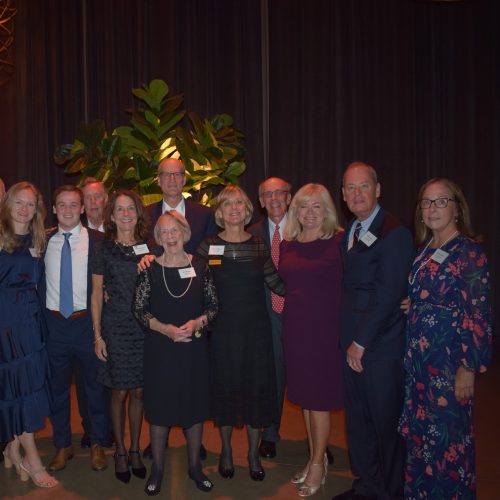
Nancy’s Story: Supporting The Cradle
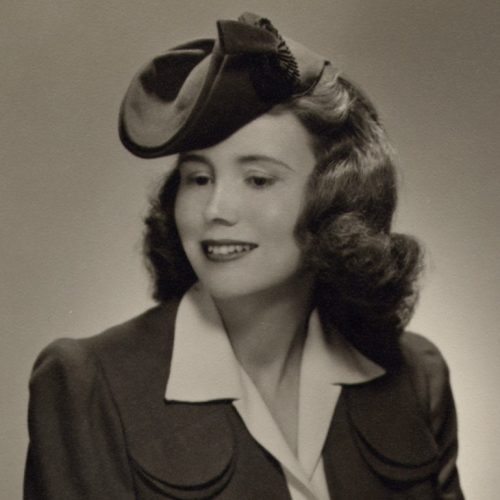
Stuart’s Story: A 75-Year History With The Cradle
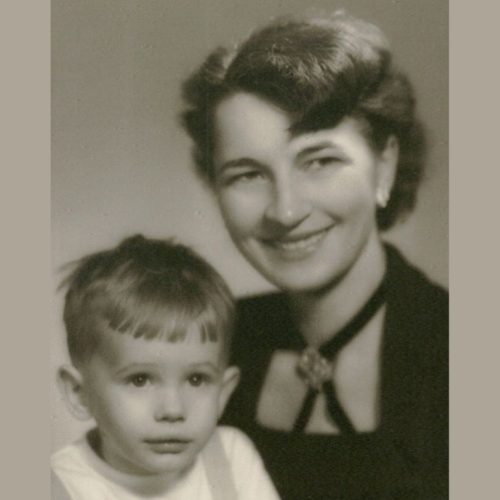
Terry’s Story: A 1946 Cradle Baby

Nancy’s Story: Supporting The Cradle
Nancy, center with the orange ribbon, pictured here with her family at The Cradle Centennial Gala.
Nancy Sanborn is the great-granddaughter of Florence Walrath, The Cradle’s founder. When she first discovered her family’s ties to The Cradle, she was eager to learn more about Florence and the history of her work.
“Both my mother and aunt had vivid memories of ‘Momma Flo,’ particularly her strong will. We should all be glad for that. I’m sure it was essential for a woman so ahead of her time in pushing the boundaries of adoption and female entrepreneurship.”
The more Nancy learned, the more inspired she became. The Cradle’s vision — of a world where every child thrives in a safe and loving family — resonated deeply with her.
“I’ve always been concerned about the many children who are born and grow up in circumstances that don’t provide opportunities to thrive. The Cradle helps tackle this complex problem and has created a lifetime of opportunities for thousands of children and families. Of course I wanted to help!”
Nancy has been a generous and passionate supporter of The Cradle for nearly two decades. Today, she is proud to see the impact of her support and her family’s enduring legacy in action.
“Whenever I meet someone from the Chicago area, I ask them if they know of The Cradle. The answer is usually ‘yes.’ I’m always struck by how many people have a story about themselves, family members, friends or colleagues who have been personally touched by The Cradle. These stories have helped me appreciate the width of The Cradle’s reach and the depth of its impact over these many years.

Stuart’s Story: A 75-Year History With The Cradle
Past Cradle Board member Stuart White remembers how his mother Margie formed a strong, resilient family through adoption and reflects on his own support for the historic Illinois adoption agency.
Cradle adoptee and former Cradle Board member, Stuart White, says that when the agency placed him at six weeks of age — over 75 years ago — with a mother who was blind from birth, they took a carefully calculated risk. After just two visits to the Detroit home of prospective parents Margie and Gene White in the fall of 1947, The Cradle agreed that Margie was up to the task (The Cradle worked with adoptive families in multiple states at that time).
“Mothers at that time were viewed as having no boundaries to their abilities,” Stuart says. “Ruth McGee was the social worker assigned to my family. In doing the home visits, I’m certain she had many things to look for: Could this woman who was blind take care of me? Could she change my diapers? Prepare the food? Could she do all the things a person [without visual impairment] does without thinking twice? My dad had a company to run, so could my mother take on all of these challenges without another adult in the house?”
Years later, Margie told Stuart that although Ruth was reluctant at first, she quickly put her reservations to rest. “The Cradle discovered that my mother didn’t have boundaries,” Stuart says with pride.
It was because of his mom that Stuart decided to become more involved with The Cradle and increase his giving to the organization over the years — to honor the remarkable person she was.
Remembering an Incomparable Adoptive Mother
Margaret Jean Cogsdill was born in 1920 with holes in her retinas — an irreparable condition. Her parents never thought of her as having a disability and encouraged her independence. She went to a public school in Detroit that had 80 kids in the classroom. When the family moved to a lakeside community, her parents gave her a canoe, which she paddled solo while her dog Brownie barked from the shoreline to guide her.
Her father, also named Stuart, introduced her to golf — a sport she played passionately until she was 81 — and he would reluctantly pull her behind a motorboat on the lake as she became an accomplished water skier. Margie was also an avid cross country skier — once competing in a Colorado race for skiers who were blind — as well as a skater, swimmer and fisher. The lake was her stage.
Margie earned a degree in economics from Mt. Holyoke College, regularly taking the train to and from Massachusetts on her own. In 1943, she married Gene White, whom she’d met at a party in Grosse Pointe. This was during World War II, and Gene was just days away from shipping out to the Aleutian Islands. The wedding took place in Everett, Washington, where he was stationed at the time.
Starting an Adoptive Family
During the war years, Margie worked at the Red Cross, took graduate classes at the University of Michigan and worked the switchboard at her father’s company, Cogsdill Tool Products.
Gene returned safely after the war and went to work with his father-in-law at Cogsdill. He and Margie adopted Stuart (named after his grandfather) in 1947. They adopted Stuart’s sister, Cindy, also a Cradle baby, in 1949. Two more children joined the family in 1958 and 1960 through an adoption agency in Michigan.
The Whites were always very open and honest with their children about adoption. “They would tell each of us, ‘You were loved, but your mother couldn’t take care of you and we found you. We chose you,’” Stuart says. Stuart recalls having a vivid imagination as a child and envisioning The Cradle, literally, as a giant cradle that held babies until they were taken out and brought home with a family.
“My mother taught us as little kids how to ride a bike, play golf, water ski and ice skate,” Stuart says. “She also taught us how to fish on the lake, and when we didn’t want to put the worm on the hook, she’d say, ‘Give me that,’ and put it right on. She had no fear about those sorts of things.”
Stuart attended DePauw University in Greencastle, Indiana. On the first day of classes, he met a girl named Suzie who was also adopted, and who would go on to become his wife. While he was encouraged to join the family business upon graduation, he didn’t feel the corporate life calling to him. It was the late 1960s, and as a socially conscious person, Stuart decided instead to become a teacher. After earning a master’s degree from Syracuse, he and Suzie settled in Ann Arbor, Michigan, where Stuart taught middle and high school social studies until 2002.
Margie, meanwhile, was a very active volunteer, serving on numerous nonprofit boards and helping to found a teen center in her community. In 1962, she received the “Exceptional Woman of the Year” award from the Detroit Rotary Club. When Gene White passed away in 1973, Margie stepped in and assumed the chairmanship of Cogsdill Tool. The company relocated to Camden, South Carolina, in 1977, and a year later Margie married William Walters, Cogsdill’s new president.
By the summer of 1992 — after chairing Cogsdill for nearly two decades — Margie, then 72, told Stuart she was tired and wanted him to chair the company going forward. He agreed, and for the next 10 years, while he was still teaching, Stuart shuttled back and forth between Michigan and South Carolina.
Returning to The Cradle and Supporting Adoption Services
In 1987, Stuart made his first visit to The Cradle since his placement 40 years prior. Ruth McGee was still with the agency at that time, and she talked with him about first visiting his parents’ home and how impressed she was by Margie.
Although Stuart didn’t return again until 2013, he came with a renewed interest. He describes The Cradle as “a place of dreams” and is quick to acknowledge what a wonderful life he’s had, thanks in large part to his adoptive parents.
“When it became easier for me to start donating, I did, and the reason I started was to honor Margie White,” Stuart says. “No doubt about it. All the issues she’d gone through — and what made me this OK person — needed some kind of return. Her memory was the reason.”
In addition to serving as chairman of Cogsdill Tool, Stuart also chaired the board of Washtenaw Technical Middle College, a Michigan public school academy that enables high school students to earn college credits. He and Suzie have two children, Megan and Caleb. When he joined The Cradle Board in 2014, he had the unique position as the only “Cradle baby” to be serving.
Margie died in April of 2009, a few months shy of her 89th birthday. The following excerpt from her obituary, written by Stuart, beautifully captures the essence of his incomparable mother:
“The awkward act of folding a contour sheet or cooking dinner for a family of six or putting a worm on the hook for her children in the boat adrift on Orchard Lake or shuffling a deck of cards prior to dealing them to the Bridge players at her table go a long way in explaining how gracefully Margie navigated in her sightless world. Her amazing mind cataloged volumes of data without visual cues. Her fearlessness in a perilous world inspired all who knew her.”

Terry’s Story: A 1946 Cradle Baby
Cradle adoptee Terry is an avid supporter of The Cradle, saying that being adopted has given him an extraordinary perspective on parenting his own children.
Terry counts July 12, 1946, as one of the luckiest days of his life. Only two months old at the time, Terry was adopted from The Cradle by Herman and Genevieve Hersperger. Three years later, his baby sister, Carren, was also adopted from The Cradle. He says, “I always felt special because my parents told us every night that we were chosen from The Cradle.”
Though both parents are now deceased, Terry says he loved his mom and dad dearly and is forever grateful for the wonderful life they gave him. He and his wife, Joan, have two children of their own. Son Stephen is a surgeon and daughter Janelle is an executive in commercial banking. “Being adopted gave me an extraordinary perspective on parenting my own children,” Terry says. “I had great role models in my adoptive parents.”
Supporting The Cradle
Herman and Genevieve were so grateful to The Cradle that they made a bequest in their will. Terry has done the same and stays in touch with Cradle staff regularly. “I was always proud to be a Cradle Baby and will do anything I can to support The Cradle and other adoptive families. I hope people will make donations on [events like] Giving Tuesday and I am happy to be one of the matching donors!”
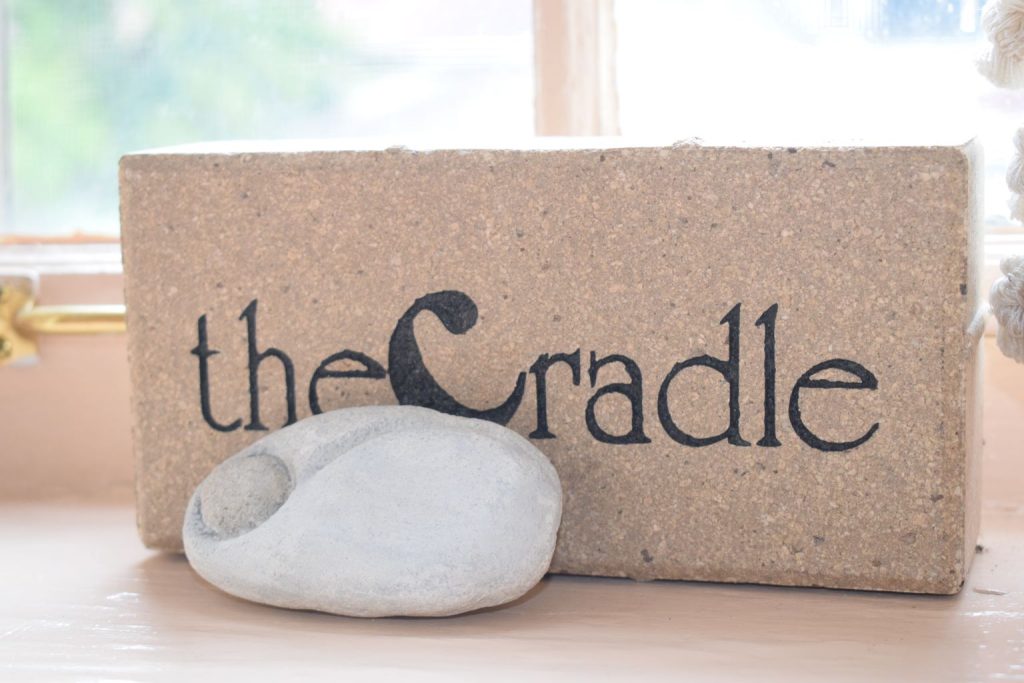
Financial Information
Amidst this pivotal moment in The Cradle’s history, we strategically directed investments towards expanding services and growing our programs. These investments included growing our team to bolster our therapy practice, appointing a new Nursery Director, and filling pivotal leadership roles essential for charting strategic growth over the next century. Additionally, substantial resources were allocated to broadening access for expectant and birth parents, adoptees and adoptive families.
Expenses
(in thousands)
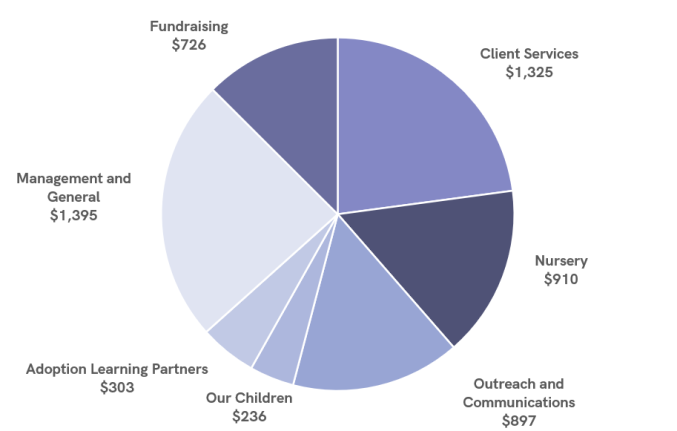
Revenue
(in thousands)
